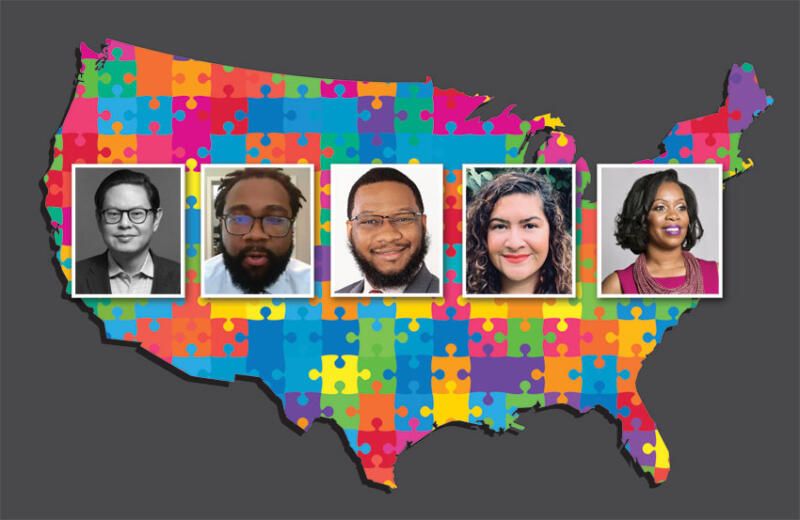Redistricting in Southern States: Communities of Color Push for More Equity
(Above, Inset: l-r): Michael Li, Senior Counsel, Brennan Center’s Democracy Program; Evan Milligan, Executive Director, Alabama Forward; Kyle Brazile, Director of Civic Engagement, NC Counts Coalition; Iliana Santillán, Executive Director of El Pueblo; and moderator, Jennifer R. Farmer, Founder of Spotlight PR. (Siliconeer/EMS)
Midway through the redistricting process, partisan map makers are drawing maps aimed at undercutting the potential influence of communities of color, even as state legislatures pass new voter restriction laws. This is particularly dramatic in the South, even as new multiracial coalitions are emerging to push for more equitable representation. Speakers – Michael Li, Senior Counsel, Brennan Center’s Democracy Program; Evan Milligan, Executive Director, Alabama Forward; Kyle Brazile, Director of Civic Engagement, NC Counts Coalition; Iliana Santillán, Executive Director of El Pueblo; and moderator, Jennifer R. Farmer, Founder of Spotlight PR – discuss the latest trends and community efforts to counter them.
Q: What’s happening, and what it means for our democratic practices across the South?
Michael Lee: Redistricting is the redrawing of Congressional maps around the country. It has been completed right now in 20 states. The Census data came out later than expected so the process is being compressed into the fall and winter of this cycle and that has meant that there is a lot of things are being rushed.
We’re also doing maps with COVID so there’s less opportunity for the public to participate in many states.
The reality is that when we draw maps in this country, we also end up litigating about them, particularly when there are racially discriminatory maps. The litigation is starting to kick-off, but it will have to be completed really fast if maps are going to change for the 2022 midterm and there’s not a lot of time to do that, candidate filing has already started in Texas. It will soon start in North Carolina and other states and the primary is just a matter of months away. Mail ballots in Texas go out in 43 days and so there isn’t really a lot of time to win changes to maps before the 2022 election, so everything is chaotic and there’s a possibility that we will see primaries move as a result of litigation.
Communities of color, the Latino communities, Asian communities, the black community, accounted for almost all of all of the country’s population for the last decade. The white population went down last decade, for the first time in American history. That trend also applies to eligible voters, citizens over 18. Latino and other non-white groups accounted for most of the country’s popular increase in ineligible eligible voters last decade but when it comes to drawing maps, the important thing to understand is that in much of the country, including all of the South, the process is still a political process. It is done through legislation usually subject to gubernatorial veto and in the South, one party controls everything and when one party controls everything whether it’s democrats or republicans, that is a recipe for abuse and that’s certainly something we’re seeing this decade.
Legislative redistricting Louisiana and Virginia are the only two exceptions. Virginia has a bipartisan commission that’s supposed to draw maps, it deadlocked, so the Virginia Supreme Court will draw maps. Louisiana has a legislative process, but Louisiana is the only southern state with a democratic governor, has a republican legislature but a democratic governor and the governor can veto maps and that will send the drawing to the courts.
In other states, republicans have free reign to do whatever they want and that is something that has historically been a recipe for racially discriminatory maps, politically discriminatory maps.
Communities of color are the focus of a lot of map drawing especially in fast-growing states like Texas and Georgia that are becoming very demographically diverse.
Around the country, there is a trend of elimination of competition where communities of color would normally be expected to do well. Whether there will be federal legislation either the Freedom to Vote Act or the John Lewis Voting Rights Advancement Act that will help provide additional protections for communities of color, will depend on figuring out a way around the filibuster.
For people who want to get involved and who really want to understand what’s happening in their respective communities, there’s several places – League of Women Voter chapters; Common Cause; there is a website called All About Redistricting which is hosted by Loyola Law School in California also has a lot of information about the process. There are a lot of groups around the country that are organizing around this and there’s been a lot of funding of groups that represent communities of color, and those could be some good resource.
Q: What’s the connection between redistricting and the passage of laws that make it harder for people to engage in the process and vote?
Michael Lee: I think they’re flip sides of a coin. The laws that are making it harder to vote, are like death by a thousand cuts. It’s making it harder to register, restricting the voter hours, and your vote really doesn’t matter because the result has already been predetermined.
Q: Will you share with us the work that you all are doing in North Carolina and what you’re seeing?
Kyle Brazile: We are committed to building a healthy, just and equitable North Carolina through cross-sector partnerships, advancing systemic solutions for communities facing systemic barriers. Our organization, NC Counts Coalition, served as a hub to facilitate cross-sector partnerships and coordination while we were working on Census count in North Carolina and being self-serving, we did a phenomenal job in a lot of hard to count places and over the last several months we have facilitated and coordinated work between coalition members, various grassroot organizations, as our state has gone through the redistricting process.
We’ve really worked hard to be a statewide organization, have a statewide approach, but try to connect folks to the issues and the impact that’s going on locally. From the beginning we fought for fair maps and really trying to push maps that had a lens and have a lens towards racial equity and embrace the notion that we have to keep our communities whole.
We also recognize though that fair maps begin with a fair right and a process that provides access, education opportunities, for the people to participate and we’ve seen a process where many of the organizations on the ground and throughout our communities have taken the lion’s share of the work to inform our communities.
We’ve not seen access, education, training opportunities provided from the government and from the legislature.
According to the Census, North Carolina is becoming more diverse. Our Latinx population and Asian American population communities are growing exponentially, and our urban areas continue to grow, while our rural areas are actually losing population.
Statewide, we have an additional Congressional seat. We have more votes on the Electoral College.
In Southern states, North Carolina, the legislature holds complete authority for statewide redistricting and there is no commission. The governor has no authority to veto and the legislature passed their resolution to determine the districts and often the only recourse to an unfair process and unfair match is litigation in the courts.
Locally, we look at municipalities and counties and we see a lot of changes to ensure equal population and representation and like many states, these locales, they are doing the work and they all have separate criteria. In our opinion, we often saw people, community members, organizations stepping up to fill those gaps.
Q: Can you talk to us about what you’re seeing and efforts to encourage the community to get involved?
Iliana Santillán: When we talk about redistricting and the Latinx community, it just feels like we started two steps back. First of all, the process, it took us a while to even find the word in Spanish. Community members just didn’t understand the process. Community organizations like El Pueblo, along with others within the state developed a website where we’re able to share the documents that we create with our perspective. We’re working on creating videos, graphics that really help people understand, not just the process, but how it affects them, so it’s been a real challenge to for us to be able to get community members to again understand the process and be vocal in how these issues are affecting.
Q: Can you talk to us about what you’re seeing in Alabama? Sometimes when people testify at hearings they don’t always receive a warm welcome, do encounter that in Alabama?
Evan Milligan: In Alabama, it was an interesting experience because this was the first round of redistricting since the Shelby decision. We didn’t have the department of justice playing that pre-clearance role, for our coalition, we wanted to make sure that citizens were as empowered as possible, particularly from those that have a commitment to race equity.
People of color living in the state that we were empowered to go to the public hearings and to submit statements, proposed maps, felt reflected, race equity principles and that was an interesting thing.
To mobilize Alabamians to even show up to give information to our legislature, our organization, a coalition of about 28 civic engagement groups based throughout the state, worked with those members, non-members, members of the donor community who support pro-democracy work here in the state as well as an election protection network and a communications hub that’s interested in supporting pro-democracy work in the state of Alabama. Once that Census data was released, in August, we had already been meeting for two months and had had somewhat of a familiarity with people’s different positions and entry points into the conversation and that was just really critical to have that space so that when it was time to mobilize people, we actually had a community that was sharing information, that was doing public activities with each other, that was organizing forums and participating and that that gave us a space where we could share messaging and make sure that people who wouldn’t have normally been present in those conversations, could be motivated to participate.
One of the things that that is important to think about particularly as far as the role Alabama plays in this country is, we’re often a place that incubates some of the worst and most extreme forms of tribalism and forms of far-right sorts of nationalism and that tendency that we have it’s also counterbalanced by the work and the tradition of people who emerge to oppose that and to work to really represent the best tendencies and hopes of democracy.
This tension in Alabama that we’ve wrestled with and that’s sort of a part of our legacy here over the last four, five, six years.


